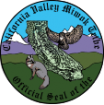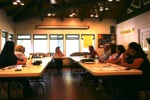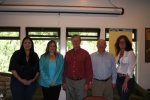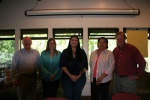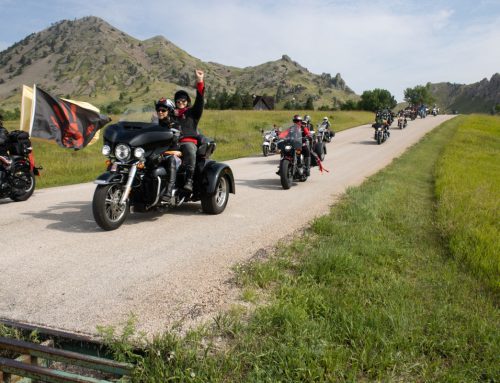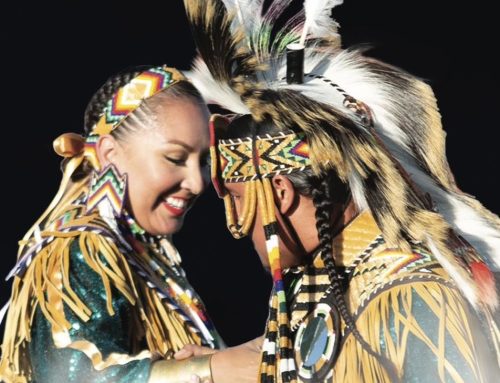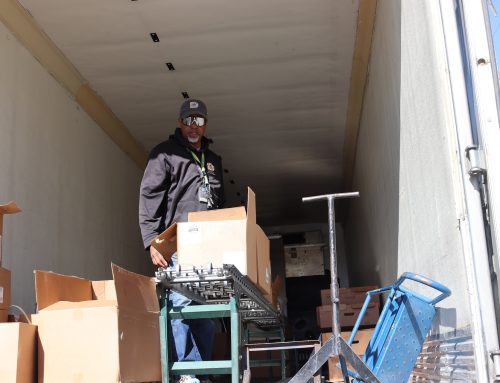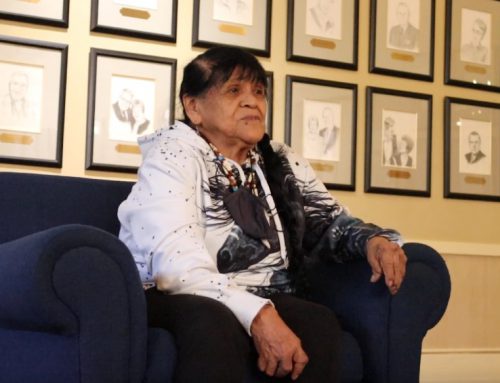The California Valley Miwok Tribe (located at 10601 N. Escondido PL, Stockton, CA, as listed in the Bureau of Indian Affairs’ BIA/DOI Spring 2011 Tribal Leaders Directory), a federally recognized tribe eligible to receive and distribute services from the federal government – on Thursday, May 12, 2011, attended an initial consultation with the Federal Energy Regulatory Commission (FERC), hosted by the Tuolumne Band of Me-Wuk Indians. The California Valley Miwok Tribe originally had a meeting scheduled to be held on Thursday, May 12th, at the tribal offices at 10601 Escondido Place, but cancelled to attend the alternate meeting at the Tuolumne Rancheria when invited, to share concerns and support any consensus that may be decided upon in working with other participating tribes.
Debra Grimes, the Tribe’s Cultural Preservation Director, was unable to attend due to a previous commitment involving a site inspection, but the tribal participants felt their concerns were well represented by the expertise of the other attendees and the vast knowledge displayed by Reba Fuller – a Governmental Affairs Specialist for the Tuolumne Band of Me-Wuk Indians. On this day, the tribal representatives arrived early to confer on the many issues that affect all tribal people within Indian country, to update other attendees of the current status of the Tribe and to consult with other participants as to the project in question and the various areas that are a mutual concern to all Indian peoples; including but not limited to culturally sensitive historical and pre-historical sites, water amounts of the local waterways, lakes and ponds, aquatic life and indigenous plants.
The project is officially designated “Don Pedro Project FERC No. 2299” and is scheduled for re-licensing. The re-licensing of this project is a complex issue due to the fact that current cultural preservation and environmental laws were not as stringent and in some cases did not even exist when the last licensing agreement was approved. In attendance for the tribes were Reba Fuller, Stephanie Suess, Vicki Stone and Darli Bez, representing the Tuolumne Band of Me-Wuk Indians (the hosting tribe). Mary Motola attended representing for the Picayune Rancheria of the Chukchansi Indians, Jan Costa represented for Chicken Ranch and Chairperson Silvia Burley and Tiger Paulk represented for the California Valley Miwok Tribe. FERC representatives present were Frank Winchell, anthropologist/archeologist and James Hastreiter, aquatic ecologist. After introductions and the passing out of informative documents concerning the project, Frank Winchell went into great detail of the congressional act which created his department and of its oversight and responsibilities. The tribes then discussed with FERC about tribal consultation and under what statute that consultation is defined.
Mr. Winchell then had all present follow along with him in referencing specifics within the provided documentation. Reba Fuller requested further specifics and inquired if there was any foreseen expansion of the project. She and others then asked for further explanation, which delved more deeply into project specifics that were answered by both Mr. Winchell and Mrs. Hastreiter of FERC. Mary Motola of Picayune and Stephanie Suess, representing Tuolumne, contributed much to the exchange of information. Subjects also discussed were the use of the waterways and of the people that would be affected by what was being proposed at this meeting, including water quality for drinking, recreational use, indigenous plants and wildlife; as well as power generation and the previously mentioned culturally sensitive areas this project affects.
Jan Costa brought up specific concerns that her tribe has, which James Hastreiter, while addressing the inquiry, initiated into open discussion that included all attendees. Reba Fuller posed the question of periodic droughts, which brought out the full involvement of the tribes and they well-articulated many questions of concern for the Native American community. Mr. Winchell and Mr. Hastreiter were very well versed in these topics and were able to give answers that were very in-depth and helpful to the tribes in understanding FERC’s position, subsequently being fully informed. Questions were posed additionally of privately owned lands impeding access and the inclusion of other agencies in the process. The communication throughout the consultation was very open and insightful and for the most part, the FERC representatives were able to answer all questions presented to them, even going over scheduling of the process and discussing the timelines and milestones that would have to be met before proceeding to the next step. Pre-existing impacted areas were also of great concern and there was discussion of how to correct the disturbed areas that were not properly protected to due previously deficient cultural protections. FERC stated that on this and all other issues discussed, that they would want to make sure every aspect and issue would be resolved before the issuing of permits, in order to ensure that there will not be future problems after licensing is completed.
Ms. Fuller kept the meeting very insightful, asking a wide array of questions that needed answers assisted by representatives of the Tuolumne staff and Mary Motola of Picayune, and Jan Costa of Chicken Ranch represented their tribes well. Even though we attended without our Cultural Director, CVMT even was able to ask important questions by just being in the same room with this wealth of knowledge and we are honored to be involved in this endeavor, working alongside these other native California tribes. What happened on this day cannot be done justice in the limited text of this story. There are many sensitivities involved and this is a very long-term consultation, but with the coming together of the tribes that were present, the dignity and eternal resting places of those that we have descended from and their previous areas of importance will be protected by any adverse impacts of the proposed actions that now or in the future may be considered within this project.
At this time, the California Valley Miwok Tribe would like to thank the Tuolumne Band of Miwok Indians and their governmental and cultural departments for being such gracious hosts for this first consultation with FERC and for making us feel so welcome while in attendance.

